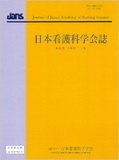Japanese
English
- 販売していません
- Abstract 文献概要
- 参考文献 Reference
要旨
目的:高齢患者のせん妄発症時に,身体拘束を回避するための看護師のアセスメントとケアのプロセスを記述する.
方法:一般病棟の看護師8名に半構造化面接を行い質的記述的に分析した.
結果:身体拘束を回避するために看護師は,【症状や行動の変化から異変を感じる】ことで,【安心につながるよう言動を受け止め気持ちを和らげる】と同時に【即時の対応ができるよう見守る】中で,【症状や危険を感じた行動から起こりうる事態を予測する】と【症状や行動の変化の原因を分析するために患者背景とせん妄の発症要因に着目する】を行きつ戻りつし,【症状や行動の変化の原因には心身の苦痛があると解釈する】ことで【不快や苦痛を軽減し普段の生活に近づける】ケアをしていた.
結論:看護師は,医療安全の視点に偏らず,患者の視点に立ち安楽を目指したケアを実践することが身体拘束の回避につながることが示唆された.
Purpose: This study describes assessment and care processes of nurses used to avoid physical restraint at the onset of delirium in elderly patients.
Methods: Semi-structured interviews were conducted with eight nurses working in general wards and the interview data were qualitatively and descriptively analyzed.
Results: When the nurses ‘sensed unusual changes in symptoms and behaviors in patients’, they were ‘accepting the behaviors of patients in a manner to ease the mind of the patient, and trying to calm the patients’, and ‘observing the patients while being ready for a further immediate response’ to avoid employing physical restraints with elderly patients. The nurses provided care to ‘make the patient conditions closer to those of ordinary life by reducing the discomfort and distress’ based on the ‘interpretation that the changes in the symptoms and behaviors are caused by physical and mental distress’, while repeatedly ‘estimating the risks arising from the symptoms and dangerous behaviors’ and ‘focusing on the patient background and factors affecting the onset of delirium, to analyze the reasons for changes in the symptoms and behaviors’.
Conclusions: The findings suggest that nursing care practices to make patients comfortable from the patient view point without bias from medical safety concerns may be linked to maintaining avoidance of physical restraints.
Copyright © 2022, Japan Academy of Nursing Science. All rights reserved.


